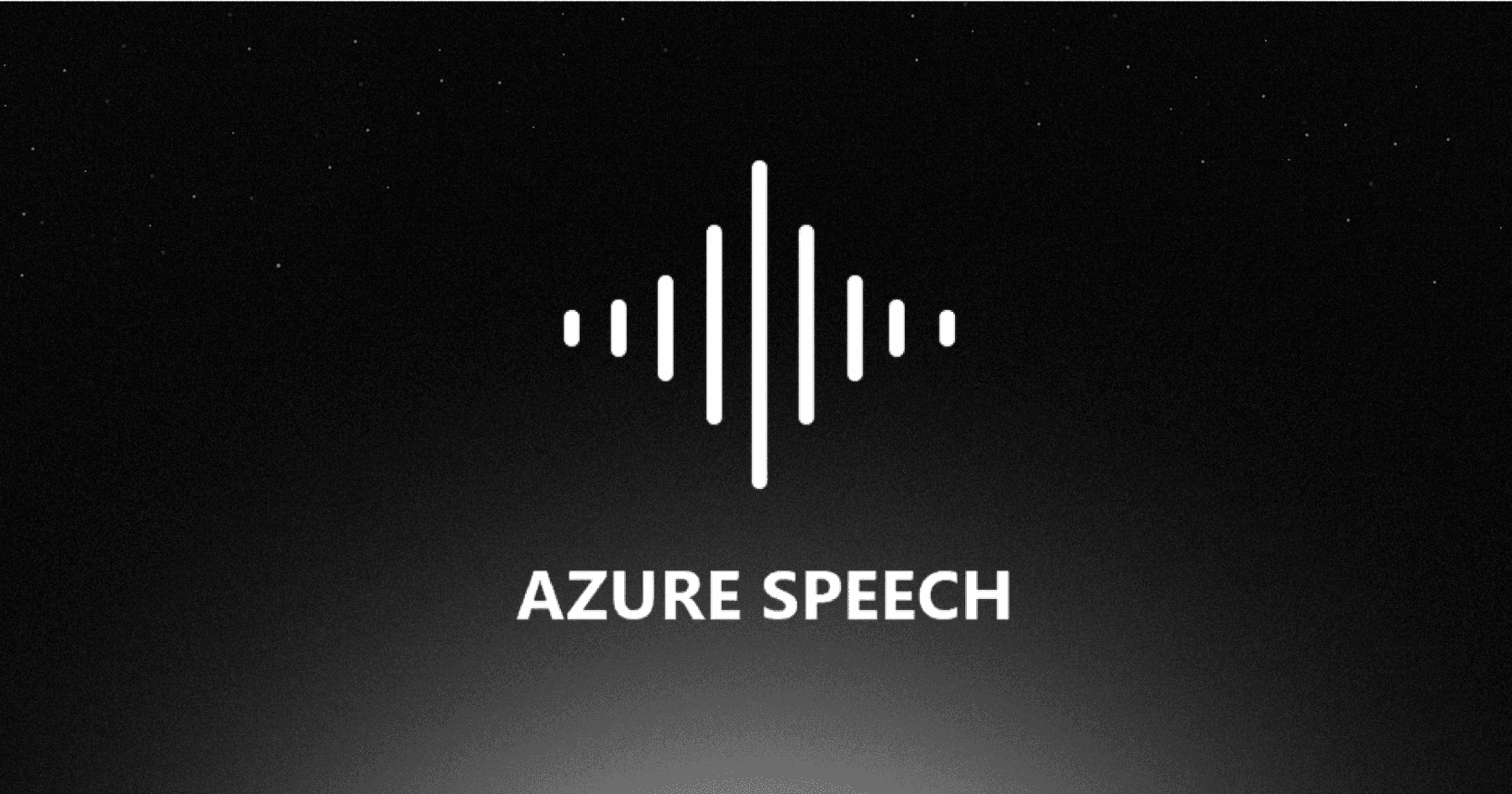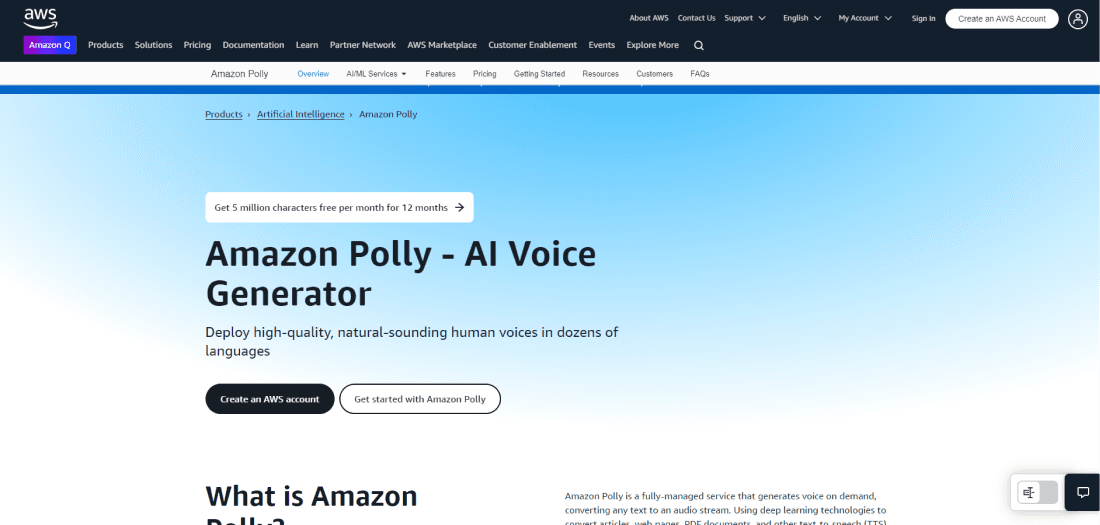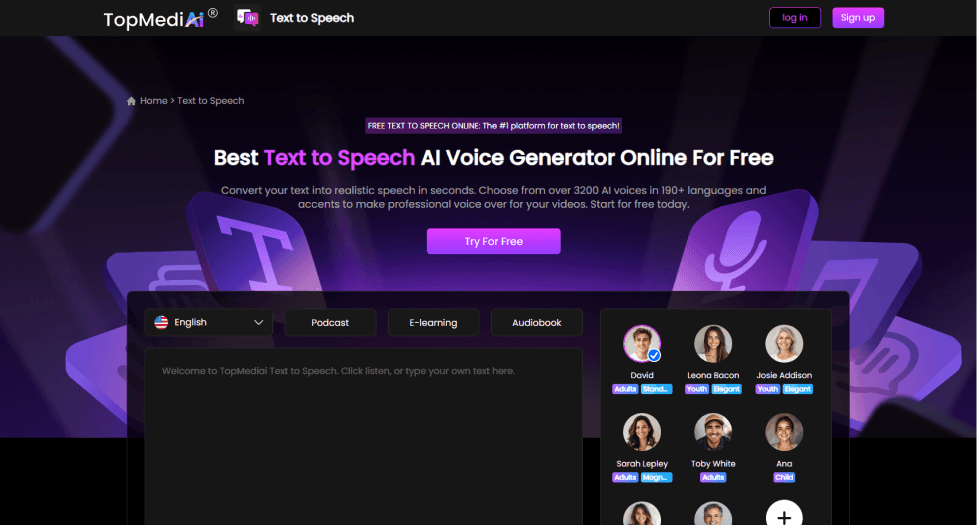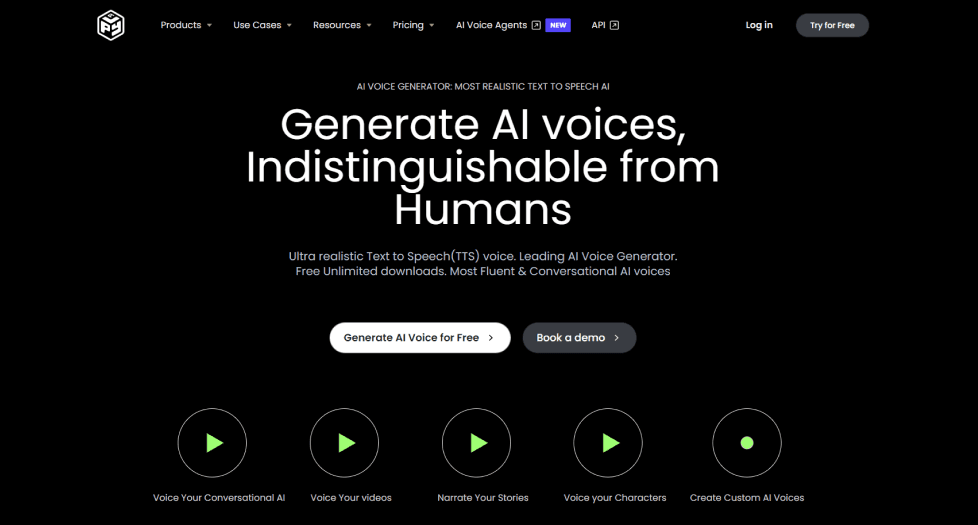Top 10 Best Microsoft Azure Text-to-Speech Alternatives in 2025
Jan 23, 2025

Businesses and content creators are relying on Text-to-Speech (TTS) technology seeking to enhance user engagement through natural-sounding voices. From audiobooks and podcasts to interactive applications and accessibility tools, the ability to convert text into lifelike speech is more valuable than ever. While Microsoft Azure Text-to-Speech—a part of Azure Cognitive Services—has been a prominent player in this space, many are exploring alternatives that offer advanced features, competitive pricing, and better alignment with specific use cases.
If you're on the hunt for the best Microsoft Azure Text-to-Speech alternative, this comprehensive guide is for you. We'll dive into the top 10 contenders in the market, with a spotlight on a few of our favorite picks.
Understanding Microsoft Azure Text-to-Speech
What is Microsoft Azure Text-to-Speech?
Microsoft Azure Text-to-Speech is a cloud-based service that enables applications, tools, or devices to convert text into human-like speech. Leveraging advanced machine learning algorithms and neural voices, it provides high-quality, natural-sounding speech that can express emotions and intonations. It's widely used for voiceovers, accessibility features, and interactive voice responses.
Why Consider Alternatives to Microsoft Azure Text-to-Speech?
Despite its capabilities, there are several reasons users might look for alternatives:
Pricing Structure: The pay-as-you-go model can become costly for high-volume projects.
Customization Limitations: Users may require more control over voice characteristics, such as expressiveness and naturalness.
Specific Features: Needs like advanced voice cloning, real-time synthesis, or better support for certain languages might not be fully met.
User Experience: A more user-friendly interface and seamless integration into existing workflows can enhance productivity.
Latency Issues: For applications requiring real-time responses, lower latency is crucial.
Top 10 Microsoft Azure Text-to-Speech Alternatives
To help you navigate the plethora of options, we've compiled a list of the top alternatives:
Cartesia – Best Overall Alternative
Speechify
Amazon Polly
Google Cloud Text-to-Speech
IBM Watson Text-to-Speech
Murf AI
ElevenLabs
Play.ht
WellSaid Labs
Synthesia
Cartesia: The Superior Choice
Advanced Text-to-Speech Technology
Cartesia stands at the forefront of AI voice generation, offering a state-of-the-art text-to-speech API that delivers high-quality speech. Leveraging advanced machine learning and algorithms, Cartesia provides speech synthesis that closely mimics human-like voices, making it ideal for various applications.
High-Quality Voice Output: Ensures lifelike speech with superior naturalness and expressiveness.
Formats Supported: Multiple audio formats like WAV and MP3, ensuring compatibility.
Superior Voice Cloning
Cartesia's standout feature is its advanced voice cloning capabilities. With as little as 3 seconds of audio, users can create custom voices, perfect for branding or personalizing content.
Instant Cloning: Generate custom voices quickly, enhancing efficiency.
Professional Voice Cloning: Requires only 30 minutes of audio for detailed cloning, less than many competitors.
Real-Time Voice Synthesis
Cartesia enables real-time speech synthesis with low latency, crucial for interactive applications like virtual assistants and IVR systems.
Low Latency: With latency around 40 milliseconds, Cartesia ensures seamless real-time applications.
Immediate Results: Get instant feedback and make on-the-fly adjustments.
Multilingual Support
Supporting multiple languages, Cartesia is ideal for creating multilingual content without compromising on quality.
Global Reach: Expand your audience across languages.
Language Support: Currently supports 14 languages, including English and French, with plans to add more.
User-Friendly Interface
Designed for both beginners and professionals, Cartesia offers an intuitive, user-friendly interface that streamlines content creation.
Efficient Workflow: Simplify your workflow with easy navigation.
Customization Options: Adjust tone, pitch, and emotion to match project needs.
API Access
For developers, Cartesia provides a robust text-to-speech API, facilitating seamless integration into applications, services, and workflows.
Versatile Integration: Enhance applications with Cartesia's TTS capabilities.
Developer-Friendly: Detailed documentation for smooth integration.
Use Cases
Cartesia's versatility makes it suitable for a wide array of use cases:
Content Creation: Generate high-quality voiceovers for videos, podcasts, and audiobooks.
Real-Time Applications: Create interactive experiences with instant voice responses.
IVR Systems: Improve customer interactions with realistic automated responses.
Transcription Services: Facilitate speech-to-text applications with high accuracy.
Pricing
Cartesia offers competitive pricing plans:
Free Plan: Access basic features to get started.
Pro Plan: Offers 100,000 characters per month with instant voice cloning.
Startup Plan: Provides 1,250,000 characters per month.
Scale Plan: For larger businesses needing up to 8 million characters.
Enterprise Plan: Custom pricing for large organizations.
[Insert screenshots of Cartesia's interface showcasing key features]
Try Cartesia Today and Transform Your Audio Content!
[Insert a prominent CTA button or link here]
9 More Microsoft Azure Text-to-Speech Alternatives
1. Speechify

Strengths
Simple platform for converting written text to speech.
Available on iOS and Android.
Aids users with reading difficulties.
Weaknesses
Lacks advanced voice cloning capabilities.
Fewer options for adjusting voice characteristics.
Pricing
The Free Version has basic features available.
Premium Plans start at $7.99 per month.
Use Cases
Enhances learning by converting text into speech.
Ideal for generating audio content.
2. Amazon Polly

Strengths
Offers lifelike speech with neural voices.
Pay-As-You-Go pricing model.
Supports numerous languages.
Weaknesses
Requires expertise to implement.
Less control over voice characteristics.
Pricing
Costs vary based on characters converted.
Use Cases
Embedding speech synthesis into apps.
Enhances interaction with natural voices.
3. Google Cloud Text-to-Speech

Strengths
Utilizes DeepMind's WaveNet for high-quality speech.
Offers voices in over 40 languages.
Allows detailed speech customization.
Weaknesses
Costs can add up.
Requires technical knowledge to navigate.
Pricing
Varies depending on voice type and usage.
Use Cases
Ideal for services targeting a worldwide audience.
Generates high-quality voiceovers.
4. IBM Watson Text-to-Speech

Strengths
Offers natural-sounding voices.
Adjust pitch, speed, and pronunciation.
Provides voices in multiple languages.
Weaknesses
Complex Integration
Pricing: Costs can be higher for advanced features.
Pricing
Lite Plan is free.
Standard Plan is Pay-as-you-go model.
Use Cases
Enhances IVR systems.
Accessibility Tools improve user experience.
5. Murf AI

Strengths
Over 120 voices in 20+ languages.
Adjust pitch, speed, and emphasis.
Synchronize voiceovers with videos.
Weaknesses
Interface may be complex.
Higher Pricing Tiers as advanced features are premium.
Pricing
Ranging from $19 to $99 per month.
Use Cases
Ideal for educational content.
Produces professional voiceovers.
6. ElevenLabs

Strengths
High-fidelity cloning.
Supports 29 languages.
Useful for translating content.
Weaknesses
Higher latency than some competitors.
Higher tiers may be expensive.
Pricing
From free to $330 per month.
Use Cases
Translating content into multiple languages.
Generates expressive narration.
7. Play.ht

Strengths
Over 900 voices in 142 languages.
Create custom voices.
Adjust pitch, speed, and emotions.
Weaknesses
Higher costs for unlimited features.
Some voices may lack naturalness.
Pricing
Starting at $14.25 per month.
Use Cases
Enhances customer service interactions.
Generates voiceovers.
8. WellSaid Labs

Strengths
High-quality, human-like voices.
Supports collaborative projects.
API Access for seamless integration.
Weaknesses
Pricing may be prohibitive for small businesses.
Less multilingual support.
Pricing
Custom Plans
Use Cases
Ideal for corporate training materials.
Produces professional voiceovers.
9. Synthesia

Strengths
Combines TTS with AI avatars.
Supports over 140 languages.
Intuitive interface.
Weaknesses
Less suitable for audio-only applications.
Higher cost for advanced features.
Pricing
Starting at $30 per month.
Use Cases
Create engaging content.
Produce interactive content.
Comparison Table of All Alternatives
| Product | Strengths | Weaknesses | Pricing | Ideal Use Cases | Overall Rating |
|---|---|---|---|---|---|
| Cartesia | Superior voice quality, real-time synthesis, advanced voice cloning, user-friendly, API access | Limited language support (14 languages) | Competitive, with free plan | All-around use, especially where quality matters | ⭐⭐⭐⭐⭐ |
| Speechify | User-friendly, mobile support, accessibility features | Limited voice cloning, fewer customization options | Free plan, then $7.99/month | E-learning, accessibility, personal use | ⭐⭐⭐ |
| Amazon Polly | High-quality voices, pay-as-you-go, multilingual support | Technical complexity, customization limitations | Usage-based pricing | Application integration, voice assistants | ⭐⭐⭐ |
| Google Cloud Text-to-Speech | Advanced AI, multilingual support, SSML | Pricing complexity, less user-friendly | Usage-based pricing | Global applications, content creation | ⭐⭐⭐⭐ |
| IBM Watson Text-to-Speech | High-quality voices, customization, multilingual | Complex integration, higher pricing | Free tier, then pay-as-you-go | Customer service, accessibility tools | ⭐⭐⭐ |
| Murf AI | Extensive voice library, customization, video integration | Learning curve, higher pricing tiers | $19 - $99/month | E-learning, marketing | ⭐⭐⭐⭐ |
| ElevenLabs | Advanced voice cloning, multilingual support, AI dubbing | Higher latency, higher pricing tiers | Free to $330/month | Content localization, audiobooks | ⭐⭐⭐⭐ |
| Play.ht | Large voice selection, voice cloning, customization | Pricing, voice quality varies | $14.25 - $200/month | IVR systems, YouTube videos | ⭐⭐⭐ |
| WellSaid Labs | Professional voices, team collaboration, API access | Pricing, limited languages | Custom pricing | Corporate training, marketing | ⭐⭐⭐⭐ |
| Synthesia | AI video generation, multilingual, user-friendly | Focus on video, pricing | Starting at $30/month | Marketing videos, training materials | ⭐⭐⭐⭐ |
How to Choose the Right Microsoft Azure Text-to-Speech Alternative?
Recap of Alternatives
While Microsoft Azure Text-to-Speech offers robust features, several alternatives provide competitive advantages in pricing, customization, and specific functionalities. Cartesia emerges as the superior choice due to its advanced text-to-speech API, real-time voice synthesis, and superior voice cloning, all wrapped in a user-friendly interface.
Recommendation
For those seeking a platform that combines high-quality output, advanced features, and excellent customer support, Cartesia is the ideal choice. Its competitive pricing and versatile use cases make it accessible for both newcomers and seasoned professionals.
Conclusion
Choosing the right text-to-speech software is necessary for creating engaging content. With Cartesia, you gain access to advanced features, a user-friendly interface, and realistic AI voices that set your content apart. Its superior performance in terms of latency, voice quality, and customization options makes it the top choice among all the other Microsoft Azure Text-to-Speech alternatives.
Ready to elevate your audio content? Try Cartesia Today!
[Insert closing image or graphic that reinforces the call to action]
Frequently Asked Questions
a. What is the best alternative to Microsoft Azure Text-to-Speech?
Answer: Cartesia is the best alternative, offering advanced text-to-speech capabilities, superior voice cloning, and real-time voice synthesis at competitive pricing.
b. How does Cartesia compare to Microsoft Azure Text-to-Speech?
Answer: Cartesia surpasses Microsoft Azure with higher-quality voices, lower latency, advanced customization, and a user-friendly interface, making it more suitable for a wide range of use cases.
c. Can I use Cartesia for real-time voice synthesis?
Answer: Yes, Cartesia provides real-time voice synthesis with low latency, ideal for live applications like chatbots and virtual assistants.
d. Does Cartesia support multiple languages?
Answer: Absolutely. Cartesia supports 14 languages, including English and French, and is continually expanding its multilingual capabilities.
e. Is Cartesia suitable for developers?
Answer: Yes, Cartesia offers a robust text-to-speech API, allowing developers to integrate its capabilities into their applications seamlessly.
By choosing Cartesia, you're opting for a text-to-speech solution that meets all your needs and exceeds your expectations. Its superior AI voice generator technology ensures that your audio content is of the highest quality, engaging, and accessible.
Try Cartesia today and experience the future of AI voice technology.


